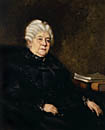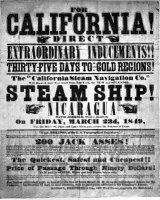| 1840-1849 |
Political
and Social History |
Literature |
| 1840 |
4 July. The Independent Treasury Act is
signed into law by President Martin Van Buren. It makes the federal
government exclusively responsible for managing its own funds.
At the Anti-Slavery Convention in London, William
Lloyd Garrison and others walk out when women abolitionists are not allowed
to be seated as delegates.
U. S. population: 17,069,453.
William Henry Harrison ("Old Tippecanoe") defeats
incumbent Martin Van Buren for the presidency.
|
Transcendentalist Club begins to publish The
Dial with Margaret
Fuller as the first editor
Bronson
Alcott, Orphic Sayings
Richard Henry Dana, Jr. Two Years Before
the Mast |
| 1841 |
Supreme Court upholds lower court ruling and
allows the Amistad mutineers to return to Africa.
13 August. The Independent Treasury Act is repealed.
4 March. William Henry Harrison is inaugurated
as president. Chilled through after a lengthy outdoor ceremony, the
68-year-old Harrison contracts pneumonia and dies on 4 April. Vice-President
John Tyler becomes president.
7 November. Slaves aboard the Creole mutiny
and sail the ship to Nassau, a British port, where they are freed.
Forty-eight wagons arrive in Sacramento by way
of the Oregon Trail, one of the earliest large groups to make this journey.
Brook
Farm Institute is founded 9 miles from Boston (1841-47).
|
Ralph
Waldo Emerson, Essays, First Series (including "Self-Reliance")
Edgar
Allan Poe becomes editor of Graham's Magazine in Philadelphia
Melville
sails for 18 months on whaler Acushnet and jumps ship in the Marquesas
in July 1842.
|
| 1842 |
May. Colonel John C. Fremont leads an expedition
to explore the Rocky Mountains.
|
Poe,
Reviews
of Hawthorne's Twice-Told Tales |
| 1843 |
Beginning of large migration westward.
Second Seminole War ends.
Sculptor Hiram Powers completes The Greek
Slave.
|
Henry
James, Jr., born in New York City.
Poe,
"The Gold Bug"; "The Black Cat"
The
New-Englander (1843-92)
|
| 1844 |
Aggressive expansionist James K. Polk defeats
Henry Clay for the presidency.
The Springfield Republican, edited by
Samuel Bowles, is founded; Bowles will publish Emily Dickinson's poetry
years later.
|
Emerson,
Essays:
Second Series (including "Experience" and "The Poet"
Bronson Alcott
and his family spend seven months at Fruitlands. See the
Concord
chronology for more dates.
Littell's
Living Age (1844-1900) |
| 1845 |
In The United States Magazine and Democratic
Review, John L. O'Sullivan writes of "the fulfillment of our
manifest destiny to overspread the continent allotted by Providence," and
the phrase catched on with expansionist politicians and the public.
Anti-rent wars in New York State protest the
patroonship system.
Texas joins the union as the 28th
state.
Potato famine in Ireland brings great numbers
of Irish immigrants. Some were indentured servants, which was not the same as being a "slave for life," as Frederick Douglass put it: "He asked, "Are ye a slave for life?" I told him that I was. The good Irishman seemed to be deeply affected by the statement He said to the other that it was a pity so fine a little fellow as myself should be a slave for life. He said it was a shame to hold me."Douglass thought, "You will be free as soon as you are twenty-one, but I am a slave for life!"
|
Poe,
The
Raven and Other Poems
Margaret
Fuller, Woman in the Nineteenth Century
Henry
David Thoreau begins living at Walden Pond
Johnson Jones Hooper, Simon Suggs
Frederick
Douglass, Narrative of the Life of Frederick Douglass, an American
Slave
American
Whig Review (1848-52)
|
| 1846 |
3 May. The Battle at Palo Alto in which 2300
Americans put to rout twice as many Mexican forces marks the beginning
of the Mexican War. At President Polk's request, on 11 May Congress declares
the U.S. at war with Mexico.
6 June. Treaty with Great Britain extends the
Oregon Territory boundary at latitude 40 degrees to Puget Sound. This allows
President James K. Polk to focus his attention on the war with Mexico.
14 June. In California, U.S. settlers proclaim
the independent Republic of California, which in August is annexed by the
United States.
15 August. U.S. annexation of New Mexico,
formerly a Mexican territory.
Iowa becomes a state.
|
James Russell Lowell publishes the first of "The
Bigelow Papers" in the
Boston
Courier to voice his opposition to
war with Mexico.
Poe,"The
Philosophy of Composition"
Hawthorne,
Mosses
from an Old Manse (includes "Roger Malvin's Burial" and "Young Goodman
Brown")
Melville,
Typee
Whitman
editor
of The Brooklyn Eagle
|
| 1847 |
22-23 February. Battle of Buena Vista in which
General Taylor's army of 4800 men defeats General Santa Anna's 15,000-man
force.
9 March. General Winfield Scott's forces lay
siege to Vera Cruz and take it on 29 March.
8 September. Scott occupies the heights
of Chapultepec and later marches into Mexico City.
22 December. New congressman Abraham Lincoln
makes a speech opposing the Mexican War.
Senator Lewis Cass proposes "popular sovereignty"
by which residents of territories decide whether the state will be slave
or free.
|
Frederick
Douglass founds The North Star, an abolitionist newspaper.
Emerson,
Poems
(includes "Hamatreya" and "Each and All")
Henry Wadsworth Longfellow, Evangeline
Melville,
Omoo
|
| 1848 |
24 January. James Marshall discovers gold
near Sutter's Fort, California. News of the find begins the California
Gold Rush of 1849.
Mexican War ends with the Treaty of Guadalupe
Hidalgo. In exchange for $15 million and the settling of $3.25 million
in American claims, Mexico cedes some 500,000 square miles of its territory
in the western and southwestern U.S.
 12-20
July. Lucretia Mott and Elizabeth Cady Stanton organize the first American
women's rights convention in Seneca
Falls, New York, where the Declaration
of Sentiments was signed by 68 women and 32 men. 12-20
July. Lucretia Mott and Elizabeth Cady Stanton organize the first American
women's rights convention in Seneca
Falls, New York, where the Declaration
of Sentiments was signed by 68 women and 32 men. Picture
of Elizabeth Cady Stanton courtesy of the National Portrait Gallery site
on the Seneca
Falls Convention.
Free Soil party organizes and nominates Martin
Van Buren on an anti-slavery platform.
John Humphrey Noyes establishes the Oneida
Community, a communal society based on the principles of "complex
marriage" and perfectionism. The society disbands in 1880.
|
James Russell Lowell, A Fable for Critics
Joel Chandler Harris born (d. 1928) |
1849 |
Amelia Bloomer begins publishing The Lily,
a journal supporting temperance and women's rights.
 28
February. First gold seekers arrive in San Francisco. (Image
courtesy of the Images
of American Political History site.)
Zachary Taylor inaugurated as 12th
president.
Harriet Tubman (1820-1913) escapes to the North
and begins working with the Underground Railroad. Tubman helps at
least 300 slaves to escape before the Civil War; during the war, she worked
as a nurse, cook, laundress, and, it is said, spy behind Confederate lines
for the Union forces. 28
February. First gold seekers arrive in San Francisco. (Image
courtesy of the Images
of American Political History site.)
Zachary Taylor inaugurated as 12th
president.
Harriet Tubman (1820-1913) escapes to the North
and begins working with the Underground Railroad. Tubman helps at
least 300 slaves to escape before the Civil War; during the war, she worked
as a nurse, cook, laundress, and, it is said, spy behind Confederate lines
for the Union forces.
|
Thoreau,
"Resistance to Civil Government"; A Week on the Concord and Merrimack
Rivers. Better known under the title "Civil Disobedience," his "Resistance
to Civil Government" recounts his experience in refusing to pay his
poll tax as a means of protesting the Mexican War.
Poe,
"The Bells"; "Annabel Lee"
Poe dies in Baltimore (b. 1809)
Sarah
Orne Jewett born
Melville,
Redburn;
Mardi
Rufus Griswold, The Female Poets of America
|
 12-20
July. Lucretia Mott and Elizabeth Cady Stanton organize the first American
women's rights convention in Seneca
Falls, New York, where the Declaration
of Sentiments was signed by 68 women and 32 men.
12-20
July. Lucretia Mott and Elizabeth Cady Stanton organize the first American
women's rights convention in Seneca
Falls, New York, where the Declaration
of Sentiments was signed by 68 women and 32 men.  28
February. First gold seekers arrive in San Francisco. (Image
courtesy of the Images
of American Political History site.)
28
February. First gold seekers arrive in San Francisco. (Image
courtesy of the Images
of American Political History site.)